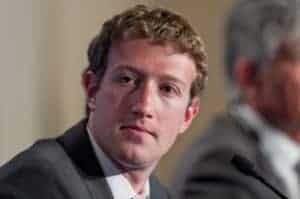 As Mark Zuckerberg heads to Congress to testify today, we thought we’d ask two Daniels experts about the recent events affecting Facebook. Andrew Urbaczewski, professor and chair of the Department of Business Information and Analytics and Michael Myers, associate teaching professor in the Department of Marketing answered the following five questions:
As Mark Zuckerberg heads to Congress to testify today, we thought we’d ask two Daniels experts about the recent events affecting Facebook. Andrew Urbaczewski, professor and chair of the Department of Business Information and Analytics and Michael Myers, associate teaching professor in the Department of Marketing answered the following five questions:
- What was your initial reaction when you heard Facebook “improperly shared” information of up to 87 million users with Cambridge Analytica?
Urbaczewski:
Why did it take so long to be public? I’m not saying Facebook was directly hiding this per se, but everybody knew there was this possibility. What’s interesting is that the researcher who collected the data had the ability to transfer the raw data to an outside third party like Cambridge.
Myers:
I was surprised given they are a walled garden and have been for many years. I thought when they initially locked it down, it was next to impossible getting any meaningful data other than data exhaust.
- Unlike a data breach, this data was harvested by Cambridge University researchers through a quiz app that users downloaded and then used their Facebook accounts to access. Cambridge Analytica, a private company not affiliated with the university, was allegedly then able to build a system off that data to target U.S. citizens with political ads based on personality traits. Is that different from what other marketing companies do?

Professor and Chair Andrew Urbaczewski
Urbaczewski:
This method of collecting data is not new. I reviewed an academic paper where an app was created solely for the purpose of gathering data about movie watching behavior. They offered a jersey of your favorite soccer team to complete a survey on movies you’ve watched. The crazy part is how willing people are to give up their own data. I certainly didn’t take this quiz, but you didn’t have to take it to be affected since the app affected relationships in your network.
Myers:
Marketing companies definitely collect data to help them target ads and promotional offers. What makes this different is the potential impact it had on our election. This type of social engineering is relatively easy with data and knowledge of cognitive biases.
- What are you telling your students about this? What are the lessons learned from something like this?
Urbaczewski:
I do a couple of sessions in my courses on the ethics of big data. Social media comes up all the time. Facebook gave users different feeds to manipulate happiness. OkCupid famously ran several experiments that manipulated users’ matches without telling them.
As a university professor, I have go to the Institutional Review Board to get permission to do any human-related experiments where we explain how we’re going to collect data and how we’re going to gather informed consent. The consent has to be communicated in clear writing that the population will understand. They’re not doing that in these cases.
As a tenured professor, if I did that, I’d at least be reprimanded if not fired. Facebook is a private company. They don’t accept federal research dollars, so they can get away with these things. But, it doesn’t make it right.

Associate Professor Michael Myers
Myers:
My students understand that data is the lifeblood of digital marketing and unless marketers create real value – that consumers opt-in for – they’re not going to allow marketers to use their data to serve their needs. The EU General Data Protection Regulation (GDPR) is a direct result of this type of transgression. It was signed into law two years ago and takes effect this May. The Facebook/Cambridge Analytica incident will only expedite the U.S. creating legislation similar to the GDPR.
- Are you doing anything differently, personally? Does this change how you operate on social media, what advice would you give others?
Urbaczewski:
I did delete my account this morning. Sunday, April 1, was my last post. I told people that if you need other contact info to get it from me. Several of my friends thought it was an April fool’s joke, but obviously it wasn’t.
Myers:
My advice to others is to read this blog and this article in the Washington Post, and then make an educated decision about whether you feel safe or not.
- Any predictions on how this will affect Facebook?
Urbaczewski:
I would say this Facebook incident is just going to blow over until the next thing happens. Remember the Equifax data breach? It’s out of the media cycle now.
With this, there is a perception that an electorate was manipulated into choosing a candidate and it appears Facebook, among others, are being blamed for that. Zuckerberg has said that he didn’t make this happen, but his company was complicit if not explicit in providing information about their users for money, for profit, for growth. I’m not sure how it’ll shake out for them.
Myers:
Although they will definitely be more careful with exactly how the data they have is shared, the impact to Facebook (usage, revenue, etc) will be nominal.
